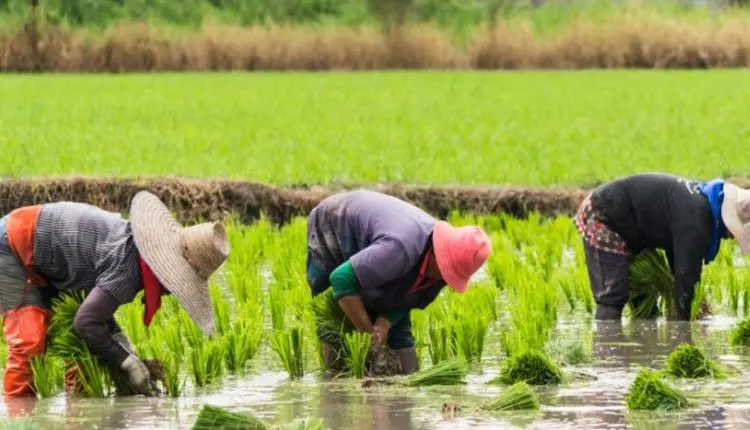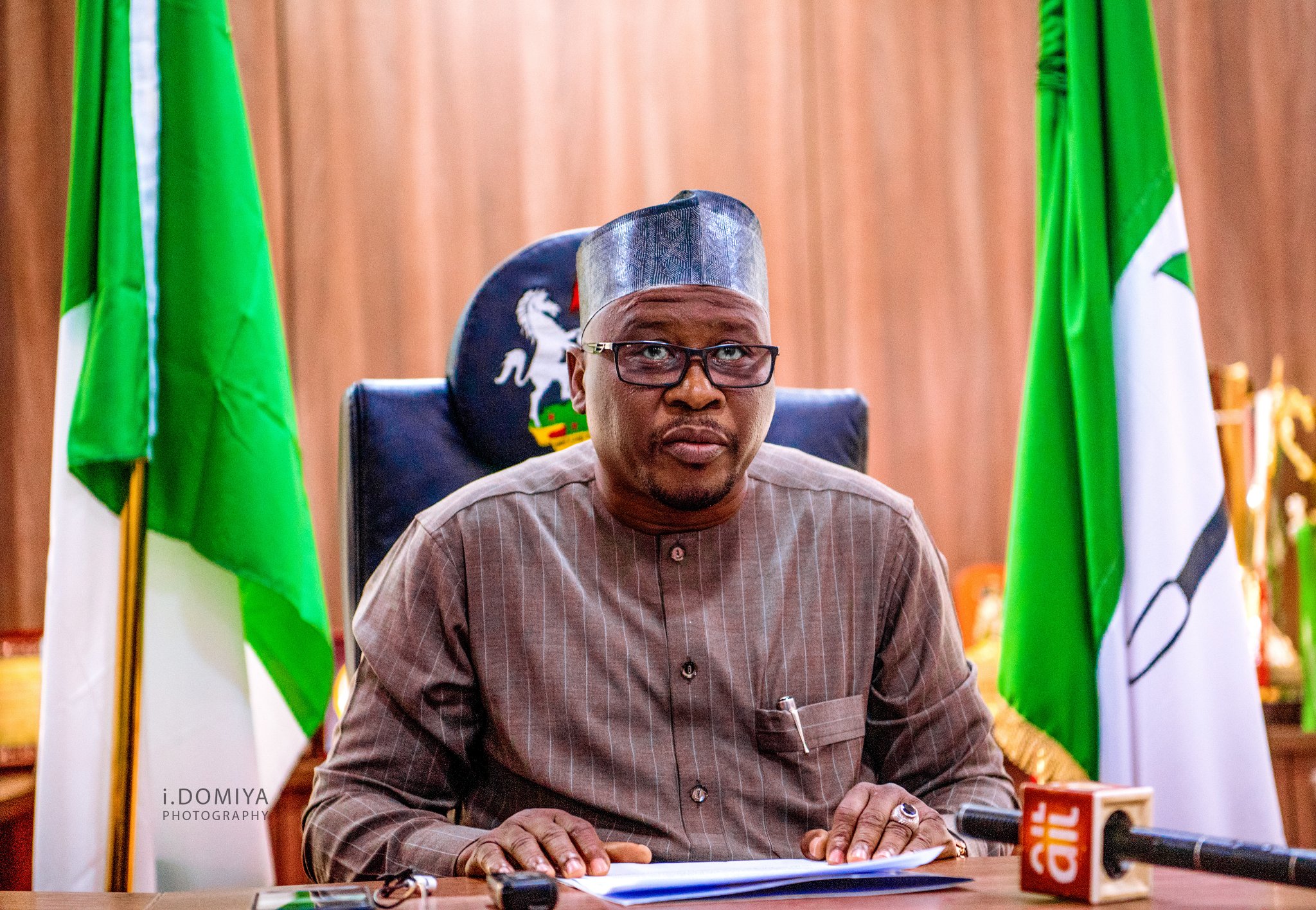Agriculture
Farmers in dilemma as tractor lease hits N50, 000 per hour

Since the beginning of the year, farmers have been struggling to cope with the rising cost of inputs, logistics and other variables, a development that forced a good number of small-scale farmers to scale down their activities.
The situation became worse when the planting season commenced fully – the cost of the inputs further soared and the energy crisis compounded it.
What actually made the matter worse, was the high cost of labour. The cost of labour, which stood at N250, 000 per worker last year, suddenly increased to N300, 000, excluding feeding, housing, medicals, and clothing.
In order to minimise cost and make things work, some of the farmers embraced the use of tractors as alternatives. To them, hiring of tractors, if well managed would make the work easier, faster and at a moderate cost.
But to the chagrin of the farmers, the cost of hiring a tractor suddenly increased astronomically, beyond the reach of average farmers.
Investigations showed that hiring a tractor, which costs between N7, 000 to N8, 000 per hour as at last year, currently goes for as high as N50, 000. This has been attributed to the cost of diesel, which rose from N350 to over N720 in the last few months.
Farmers are currently struggling to meet up with their daily farming production and other activities, due to the negative impact of the development on the sector.
A Professor of Horticulture, University of Maiduguri, who was the Pioneer Dean, Faculty of Agriculture, Yobe State University, Damaturu, Yobe State, Abba Gambo, who confirmed the development, described the situation as a big challenge to farmers.
He said: “What is happening now for land clearing using tractors is going beyond the means of farmers. The tractor uses diesel. Last year, hiring of a tractor was N7, 000 per hour for a farmer to pay for his land to be ploughed and harrowed. This year, the tractor is N50, 000 per hour. So, you now look at how the farmer can cope.
“If you are talking about four hours operation, that means you are talking about N200, 000, there’s a big challenge there. Then, still across the agricultural value chain, as you are moving, most farmers do not have access to what is called hybrid seeds, the research institutes are there, they produce many hybrid seeds, but the problem is that there is a disconnect between the farmers, the researchers and the research institutes.
“There used to be an effective and efficient extension system that takes the research from institute and universities to the farmers and vice versa, but presently, the extension delivery system in the country has collapsed completely.”
Gambo lamented that a bag of NPK 15-15-15, which was N8, 000 last year, is now N35, 000. “Honestly, I find it difficult to understand and also to justify this price, it’s very difficult to understand because farmers cannot afford it, they now look for whatever they can do to make sure that the farms are fertilised.”
The Secretary-General, Coker Farm Settlement Association, Coker, Ifo, Ogun State, Mr. Kazeem Adediran, confirmed that the cost of ploughing an acre of land in the state, which was previously done at the rate of N7, 500, has moved up.
He noted that the situation is getting out of hand, even to the point that the state government cannot provide tractors for the settlements, not to talk of providing tractors for other farmers in the state.
“As I have said, food shortage is looming and crimes of different grades will be experienced across the country.”
The Chief Executive Officer of Green Sahara Farms, Suleiman Dikwa, regretted that the development would lead to marginal decrease in food production. “We have many factors pushing the prices and the major one is the price of energy.
“We need to look at hard data and ask the question how many people actually could afford a tractor at the old cost? We have been begging for the answer, we don’t have a viable agric policy and where we do, we lack the will and sometimes the capacity to determine what is the right way to go about our agriculture.
“There will be a marginal decrease in food production. Unless we are assuming before the increase cost of inputs was appropriate and the system was working. If it was, we can say that an intervention is required because certain circumstances threw up issues that need to be resolved.
“We have at least five entities at the federal level, which enable mechanisation. We have not addressed the issue of appropriate mechanisation. What is the right machine to use a Tractor, which cost about N15m for a farmer with less than $300 annual income according to all available or the right machinery like mechanised or manual tillers, regenerative agriculture among others, which can have effect on an impactful number.”
While noting that the government needs to assist farmers at this time, Dikwa said the development is an emergency situation, which needs a radical departure from how things are done in the sector and the country.
He said: “At this time of the season, what we can do is to plan to have a more sustainable system or look at the value chain and see how we can intervene at the primary processing point – handling, transportation, storage and minimum guaranteed pricing and market.
“We can also plan for the dry season. We need to do a holistic overhaul of the system. Reduce the multiplicity of agencies and redirect the resources to value adding activities. It is an emergency situation, which needs a radical departure from how we do things in the sector and the country.”
He concluded that the government should immediately focus on reducing post harvest losses to make up for lost capacity, noting that the country can save the sum of $2.4b if the step is taken.
The Head of Farmers (Baale Agbe) in Imeko area, Ogun State, Chief Abdulazeez Ismail Abolore, said there is no doubt that the country may gradually go into famine if urgent solutions are not provided to arrest the situation.
He added that the increase in prices of energy and logistics has also affected price of feeds for poultry, fish, and others.
Agriculture
Fintiri Unleashes N2bn Boost for Farmers as Adamawa Rolls Out 2025 Agricultural Support Programme

The Adamawa State Government has launched the 2025 Agricultural Support Programme aimed at empowering smallholder farmers and enhancing food security across the state.
Commissioner for Agriculture, Prof. David Jatau, disclosed this on Friday while briefing journalists in Yola. He revealed that Governor Ahmadu Umaru Fintiri had approved a substantial N2 billion for the initiative, which targets increased agricultural productivity in the upcoming farming season.
According to Jatau, the programme—which is already underway—will provide subsidised agricultural inputs such as fertilisers, improved seeds, and other essential materials to farmers in six local government areas.
“The programme has already commenced in six LGAs—Madagali, Michika, Hong, Maiha, Demsa, and Ganye,” he said. “By next year, during the rainy season, we will extend the programme to the remaining LGAs.”
He explained that 300 hectares of farmland would be cultivated in each of the participating local governments, with 300 farmers benefitting per council.
To ensure fairness and transparency, Jatau said a multi-stakeholder committee had been constituted to oversee the beneficiary selection process. The committee comprises representatives of traditional councils, local government authorities, security agencies, youth groups, and women organisations.
“We are also equipping extension workers with training to offer farmers guidance on modern agricultural techniques for improved yield,” he added.
The commissioner noted that the intervention would not only increase food production but also generate employment, improve rural incomes, and contribute to economic stability in farming communities.
Jatau also revealed that the state government is collaborating with non-governmental organisations and agricultural development bodies, with over 2,700 hectares of farmland pledged by development partners for cultivation.
He reaffirmed the Fintiri administration’s commitment to achieving food self-sufficiency and urged beneficiaries to make the most of the programme.
Agriculture
KWASU Microfinance Bank disburses loan to farmers

The Kwara State University (KWASU) Microfinance Bank has provided loan facilities to farmer groups in and around Malete, Moro Local Government Area.
The Vice-Chancellor and Chairman of the Board of Trustees, KWASU Microfinance Bank, Prof. Jimoh Shaykh-Luqman, announced this while presenting offer letters to the farmers’ associations at a formal event held on the university campus.
Addressing the farmers, the Vice-Chancellor, represented by the Deputy Vice-Chancellor (Administration), Prof. Moshood Jimba, said the agricultural loan scheme aimed to support farmers in boosting food production and enhancing food sustainability.
“The loan is meant to support your farm operations, especially in the upcoming planting season,” he said.
Prof. Shaykh-Luqman reaffirmed KWASU’s commitment to its mantra of being a “University for Community Development,” leveraging its expertise and resources to initiate programmes that drive local development.
The Managing Director and Chief Executive Officer of KWASU Microfinance Bank, Alhaji Hakeem Hassan, noted that the agricultural loan scheme was piloted last year with 15 farmers as beneficiaries.
He added that the pilot scheme yielded positive results for both the farmers and the bank, as all beneficiaries successfully repaid their loans.
Following this success, he said, the scheme had been expanded to include more farmers under various farmers’ associations.
The News Agency of Nigeria (NAN) reports that the associations benefiting from the agricultural loan scheme include Alanu Agbelere Farmers Group, Agbedola Ketere Group, and Itesiwaju Agbe Group Omoni.
Others are Agbeloba Farmers Association (Malete Market), Agbeyewa Elemere Farmers Group, Agbe Olofeere Group, and Agbeloga Malete Farmers Group.
Speaking on behalf of the farmers, the Chairman of Agbeloba Farmers Association (Malete Market), Alhaji Mohammed Abdulrazaq, expressed gratitude to the university and the bank for their trust.
He pledged, on behalf of the beneficiaries, to utilise the loans effectively and ensure prompt repayment.
Agriculture
Kano Govt. implements N2.3bn livestock empowerment programme

The Kano State Government has begun implementing the second phase of its livestock empowerment programme valued at N2.3bn under the Kano State Agro-Pastoral Development Project (KSADP).
The Commissioner for Agriculture and Natural Resources, Dr Mamood Danjuma, disclosed this while addressing newsmen on Thursday in Kano.
Danjuma said the initiative aims to support beneficiaries with livestock, feeds, drugs, and salt lick to enhance their economic well-being.
According to him, 911 beneficiaries are being supported with two rams each, feed for three months, drugs and salt lick, while 2,386 women are being supported with two goats and a buck goat in the poorest households in the state.
He explained that the total package under the empowerment programme showed that 1,342 bulls were procured by the government at the cost of N560m, 1,822 rams were procured at the cost of N175m and 7,158 goats bought at the cost of N451m.
“Under the cattle scheme, each cattle gains 100kg over a period of 120 days. The fattening period is for 120 days, making three cycles possible in a year.
“As for the small ruminants fattening scheme, with the same 120-day fattening period yielding an extra 15kg/animal.
“The project promotes goats’ reproduction through women who will take care of the animals and sell the young ones to improve their income and standard of living,” he said.
He said that the programme promotes economic empowerment, particularly among women, by providing them with livestock to care for and sell, ultimately improving their income and standard of living.
-

 Headlines4 years ago
Headlines4 years agoFacebook, Instagram Temporarily Allow Posts on Ukraine War Calling for Violence Against Invading Russians or Putin’s Death
-

 Headlines4 years ago
Headlines4 years agoNigeria, Other West African Countries Facing Worst Food Crisis in 10 Years, Aid Groups Say
-

 Foreign4 years ago
Foreign4 years agoNew York Consulate installs machines for 10-year passport
-

 News1 year ago
News1 year agoZero Trust Architecture in a Remote World: Securing the New Normal
-

 Entertainment3 years ago
Entertainment3 years agoPhyna emerges winner of Big Brother Naija Season 7
-

 Headlines2 years ago
Headlines2 years agoNigeria Customs modernisation project to check extortion of traders
-

 Entertainment2 years ago
Entertainment2 years agoMovie download platform, Netnaija, announces closure
-

 Economy2 years ago
Economy2 years agoWe generated N30.2 bn revenue in three months – Kano NCS Comptroller













